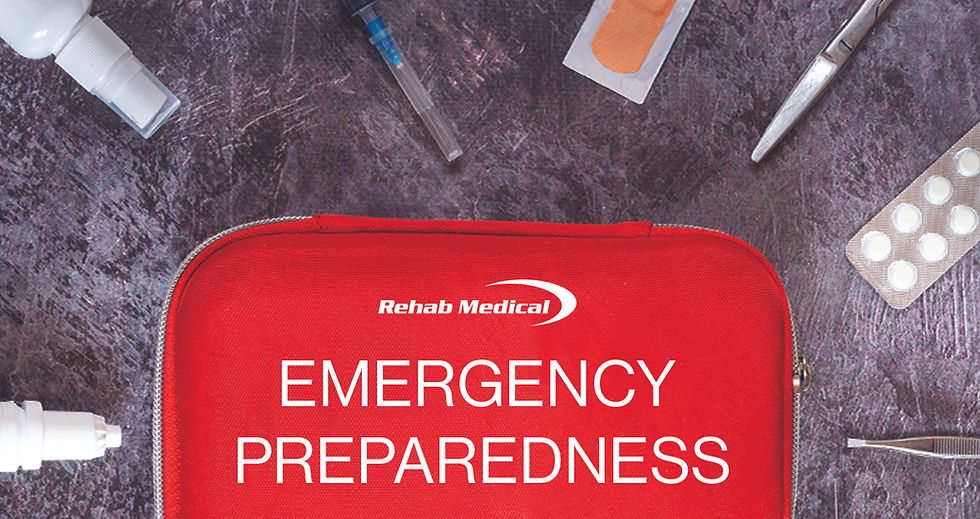A Texans Guide to Navigating Hurricanes
- Rehab Medical

- Sep 4, 2024
- 4 min read

Texas is known for having frequent hurricanes and because of this, it's important to stay informed and be prepared for when a hurricane strikes. At Rehab Medical, we understand the specific difficulties that hurricanes can pose. To assist you and your loved ones in getting ready for hurricane season, we've created a comprehensive guide specifically for wheelchair users and individuals with disabilities residing in Texas.
Stay Informed
Given Texas' vulnerability to hurricanes, memories of past hurricanes, such as the devastating Hurricane Harvey in 2017 and the catastrophic Hurricane Katrina in 2005, are heavy reminders of the immense destruction these storms can bring. Leaving communities with significant damage and loss. In these challenging times, accurate information becomes an empowering tool for safeguarding lives and property against the destructive forces of hurricanes.
Consider registering for the State of Texas Emergency Assistance Registry, STEAR to access the latest updates. FEMA is another valuable resource, providing essential storm-related information.
Additional resources.
Disaster Hotline: The Partnership for Inclusive Disaster Strategies operates a dedicated disaster hotline you can reach anytime by dialing 1-800-626-4959.
Texas Hurricane Center: The Texas Division of Emergency Management (TDEM) operates the Texas Hurricane Center, which provides updates, resources, and information specific to hurricanes affecting Texas. Their website, gov.texas.gov/hurricane, is a valuable resource.
Hurricane Phone Applications: To stay informed about the latest hurricane developments affecting Texas, download hurricane tracking apps like "Hurricane Tracker" or "Hurricane by American Red Cross.
NOAA Weather Radio: The NOAA Weather Radio shares continuous weather updates and emergency alerts.
Emergency Supplies and Shelters: TDEM also assists with locating essential emergency supplies and shelters. Choose your region and county to access local details about where to find potable water, warming centers, and protection.
Mental Health Support: Addressing stress, emotions, and mental well-being is crucial to managing one's mental health. Explore proven techniques for maintaining optimal mental health in the aftermath of a severe storm here.
Make a Plan
Preparing for potential disasters is paramount since your family may not always be together when such events unfold. Establishing a well-considered plan and routinely practicing it is essential to ensure everyone's safety. Through consistently rehearsing your emergency plan, you bolster your family's safety across all phases of a disaster. Texas government officials advise incorporating the following key components into your preparedness plan:
Emergency Contacts: Establish a list of people to contact for assistance in reuniting with your family and staying informed about your situation.
Meeting Places: Identify local and out-of-town meeting locations where your family can gather if separated or unable to return home.
Evacuation Plan: Familiarize yourself with possible evacuation routes in case you're required to leave your home. Also, understand how to turn off your home's utilities safely.
Children: Ensure your children are well-informed about the emergency plan and aware of the designated emergency contacts.
Elderly and People with Functional and Access Needs: Consider the unique health and safety requirements of elderly family members and those with functional or access needs.
Pets: Remember your furry family members. Make sure you have the necessary supplies to track and care for your pets during emergencies.
Mental Health: Addressing stress, emotions, and mental well-being is crucial to managing one's mental health. Explore proven techniques for maintaining optimal mental health in the aftermath of a severe storm here.
Create an Emergency Kit
When packing your supplies, select a portable container, preferably waterproof. Consider dividing your supplies into multiple containers to make them easier to transport. Lastly, check out texasready.gov, a Texas Department of State Health Services website with specific recommendations and a thorough checklist to help assemble your kit.

Evacuation Tips
Understanding your designated evacuation zone is critical for determining your destination in case an evacuation is necessary. You can access detailed information about evacuation zones in Texas here.
As the hurricane approaches, it's important to know that the winds may reverse. Judging these conditions, individuals should strongly consider evacuation under the following circumstances:
Follow Local Authorities: Always follow instructions from local authorities without hesitation.
Mobile Homes and Temporary Structures: If you reside in a mobile home or temporary structure, evacuate immediately, as these structures can pose significant risks during hurricanes.
High-Rise Buildings: Residents of high-rise buildings should be mindful of stronger winds at higher elevations.
Vulnerable Locations: Evacuation is strongly recommended for those living along the coast, floodplains, riversides, or inland waterways, as they are more susceptible to storm impacts.
Trust Your Instincts: If you sense imminent danger, evacuate accordingly.
Staying indoors during the hurricane is advisable for those who cannot evacuate. Secure doors and windows and maintain a sense of calm, as the passage of the storm's eye does not signal its conclusion. Exercise caution when clearing debris to avoid hazards such as shattered glass and exposed nails. Additionally, look for unstable trees and branches that could pose further risks.
In coming together to prepare, stay informed, and support one another, we can better safeguard our homes and families for the well-being of all. Together, let's prepare and weather the storm!
Subscribe to our Facebook channel to uncover more health tips!


